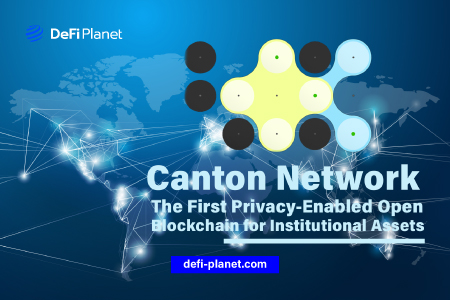The evolution of blockchain technology has been incredibly fast-paced over the years. Nowadays, it’s not a matter of whether institutions should use blockchain, but rather which one to choose.
Big players like Deloitte, Goldman Sachs, and the Deutsche Börse Group have already embraced newer blockchain networks like Canton for hosting institutional assets instead of the more established ones like Ethereum and Solana.
One of the main reasons behind this shift is that Canton offers excellent support for privacy and regulation, which suits the specific needs of these institutions. Unlike Ethereum, which is more transparent and pseudonymous, Canton’s privacy features align with regulatory requirements.
However, the use cases of the Canton network extend beyond privacy and compliance. It’s a versatile platform that can simultaneously host social media platforms accessible to the general public and sensitive banking portals that require high levels of privacy and protection from bad actors.
Furthermore, it caters perfectly to decentralized applications (dApps), particularly those used in DeFi, as it provides the desired transparency.
This outlook ultimately positions the Canton network as “a network of networks for smart contract applications.”
This article explores how the Canton network works, how financial institutions benefit from the project, and the trade-offs involved in using this network compared to other known blockchain networks.
What is the Canton Network?
The Canton network is a privacy-centric interoperable blockchain protocol. It addresses the limitations of traditional blockchains with a focus on privacy while leveraging the advantages of public blockchain networks, such as immutability and decentralization.

Canton differs from traditional blockchains that strictly host either completely public or completely private applications. The network allows developers to build different dApps on a single network.
Think of the Canton network as the Internet and dApps as the different websites existing on it. In the same way a government portal and another portal that links to a brokerage firm operate on the Internet without interfering with each other, both private and public dApps can co-exist on the Canton network without affecting each other.
The activities in one dApp on the Canton network do not impact the activity of the entire network. Even if there’s a large influx of users on one application, it does not affect transaction processing and gas in other applications, as would have been the case with a network like Ethereum.
Compared to popular blockchains like Ethereum, the Canton network is highly scalable. The network is designed to process multiple orders at once, an improvement over the single-order transaction processing on many traditional blockchain networks.
This feature ultimately makes Canton a network that can effectively process the growing needs of financial institutions.
The Canton Ecosystem
Canton Network officially launched on May 9, 2023, through a collaborative effort involving leading financial institutions, consultants, and technology firms.
Canton, by design, lacks a native token. Instead, the Canton network leverages the following solutions to facilitate transactions and incentivize participants:
Daml
Daml is the smart contract language used on the Canton network. It is an enterprise-grade programming language designed for creating privacy-enabled smart contracts in inherently public networks like Canton.
Developers on the Canton network use Daml to design dApps that fit their privacy needs. Daml effectively creates privacy models for digital assets, establishes governance processes, and ensures permissioned access per institutional and regulatory requirements.
The Proof-of-Stakeholder Consensus Mechanism
The Canton Network uses a unique consensus mechanism, Proof-of-Stakeholder, to maintain consistent data across the network. This consensus mechanism is split into two layers.
The first layer of Canton’s Proof-of-Stakeholder consensus mechanism selectively shares the network state only with the stakeholders involved in a transaction. In this instance, the details of a transaction are shared on a need-to-know basis.
Also, it means that the concerned parties in a transaction will only have access to as much information as necessary to validate the state of a transaction.
The second layer is a sequencing protocol that encrypts data and assigns timestamps to transactions as they occur. This orderly transaction processing on the virtual global ledger (decentralized record of interactions within the Canton network) is further protected by a Byzantine Fault Tolerant (BFT) Consensus mechanism. The sequencing layer generally ensures that the transactions are processed in a specific order, making the network more reliable.
Sync Domains
Sync domains (synchronization domains) serve as fault-tolerant messaging queues that transport encrypted messages between participant nodes (the smart contract program that acts on behalf of a Party and carries out transactions on the Canton network). Individuals, institutions, or government organizations on the Canton network run these nodes.
The purpose of sync domains is to allow messages to be sent across the Canton network while preventing unauthorized parties from accessing the contents of the messages.
Sync domains are either public or private. Public sync domains are accessible to all nodes on the network, while private sync domains are custom-made and selectively interoperable only with chosen nodes.
Canton Service Provider (CSP)
Canton Service Providers (CSPs) provide the infrastructure on the Canton network.
CSPs are entities or groups known as application providers on the network, some of whom deploy sync domains to increase throughput, reduce latency, or meet specific operational requirements on the Canton network.
Without the CSPs, it’s impossible to process communication and data transfer between participant nodes on the Canton network.
Anyone can become a CSP on the Canton Network and deploy their own sync domain as they see fit, further highlighting the permissionless nature of the network.

Now that there’s an understanding of the components that make up Canton’s privacy-enabled interoperable network model, let’s discuss why financial institutions are showing serious interest in Canton.
How the Canton Network Serves Financial Institutions
The Canton network exhibits certain features that make it a suitable blockchain solution for institutional use. In addition to privacy, which is inherent in the design of the Canton network, there are other significant features of the Canton network for use in financial institutions. These features include:
Interoperability
Canton network solves the lack of interoperability inherent in the design of blockchain networks and, thus, promotes collaboration between these traditional financial institutions while retaining the core features of a blockchain network.
Using the Daml smart contract, these financial institutions can program how they want assets to be represented and other criteria that bind such collaboration.

The Canton Network also supports plugging into existing blockchain networks that these financial institutions have already designed. Canton’s design allows these financial institutions to offer a unique financial product previously impossible in the traditional financial market.
Scalability
Although the Ethereum network is widely used in DeFi, it is often congested and unable to process large transactions, nor can it compete with conventional payment infrastructure such as Visa, which can process up to 65,000 transactions per second. This constraint makes it difficult for Ethereum to meet the needs of the financial industry.
The Canton network, however, solves this problem as its infinite scalability allows it to cater to the diverse needs of financial institutions connected to the network.
Scalability is built into the network’s design. Canton runs as a network of networks, rather than a single network with a single transaction ordering system. Each application deployed on Canton operates as an independent subnet. Thus, Canton can be simply described as networks of subnets.
This way, the influx of transactions on one dApp does not negatively impact the use of the entire network. As such, Canton can process as many transactions as possible. The only limitation would be the capacity of a subnet.
Regulatory Compliance
Many Layer 1 blockchain solutions have attempted to solve scalability issues but have largely failed to make their networks regulatory compliant. This lack of compliance has made these Layer 1 blockchain networks an unsuitable solution for corporate institutions, particularly in finance, where regulatory compliance is essential.
The Canton network is designed to meet the requirements of regulators and law enforcement agencies. The network is GDPR-compliant, which is a crucial aspect in ensuring adherence to regulations.
With Canton’s inherent privacy model and the use of the Daml smart contract language to create functions within the network, financial institutions can establish processes that protect consumer data while still being able to share relevant data with regulatory bodies when necessary.
Canton Network’s Biggest Challenge
While the extent of the application of the Canton network goes as far as developers’ innovative minds, the network faces one significant challenge that may impede its success: adoption.
There is an unending list of blockchain-related solutions with little to no adoption. Every project lacking adoption further diminishes the chances of a new technology being widely adopted.
Canton will have to compete for users with popular blockchain networks such as Ethereum, which have been battle-tested. It will also face competition from other enterprise-grade blockchains like Hyperledger Fabric and Quorum, which have also demonstrated a track record of success in solving institutional-level problems.
Considering that traditional corporations are known to take calculated risks, it may be difficult for Canton to gain as much traction as required to test just how far the network extends.
Future Outlook for the Canton Network
Existing institutional-grade blockchain systems in financial firms such as JP Morgan and Citigroup, while substantial, are limited in terms of use and have yet to achieve full interoperability. This leaves a gap that the Canton Network’s design can readily fill.
The institutional use of Canton will open up countless solutions, including secure data sharing, real-world asset tokenization, and improved collaboration among traditional financial institutions.
Canton’s interoperable nature also allows financial institutions that are already leveraging solutions based on an enterprise-grade network to plug their existing solutions into the network, making onboarding less demanding.
Canton’s success, however, depends on the willingness of these corporate institutions to step outside their comfort zones and embrace the benefits of newer solutions.
Over the next few months and maybe years, Canton will have to demonstrate tangible benefits and showcase successful use cases to inspire confidence and encourage more institutions to embrace its technology.
Conclusion,
- The Canton network sets a new standard for how institutional-grade blockchain should work by addressing the limitations of existing solutions.
- The network’s ability to replicate the heterogeneous nature of the Internet extends what is possible in the finance sector. It enables different corporations to independently exist on the network and provides support for collaboration at the same time without the need of an external party.
- The support from prestigious traditional institutions such as Deloitte, Deutsche Börse Group, Cboe Global Markets, Goldman Sachs, and many others further reflects the growing demand for such secure and interoperable blockchain networks for use in the finance industry.
- Although Canton has a long road ahead to prove its effectiveness, the network could be one that houses major financial institutions and shapes the way enterprise-grade networks are designed for the industry.
Disclaimer: This article is intended solely for informational purposes and should not be considered trading or investment advice. Nothing herein should be construed as financial, legal, or tax advice. Trading or investing in cryptocurrencies carries a considerable risk of financial loss. Always conduct due diligence.
If you would like to read more articles like this, visit DeFi Planet and follow us on Twitter, LinkedIn, Facebook, Instagram, and CoinMarketCap Community.
“Take control of your crypto portfolio with MARKETS PRO, DeFi Planet’s suite of analytics tools.”





















